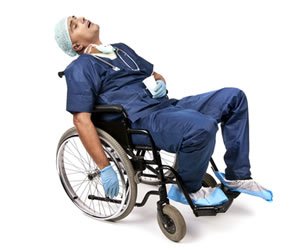
Advice for Interns on Night Float
Earlier this year SDN member bob123451 was the lucky intern starting residency on night float ... Read more
Written by: Student Doctor Network
Published on: October 13, 2016
Once you complete medical school, you must complete a residency to practice medicine. Learn more about the Match, residencies, different specialties, and life as a resident physician.

Earlier this year SDN member bob123451 was the lucky intern starting residency on night float ... Read more
Written by: Student Doctor Network
Published on: October 13, 2016

Central to the skillset of every physician is the differential diagnosis; this is the process ... Read more
Written by: Brent Schnipke
Published on: September 26, 2016

The tradition of long hours on the floor is an old one in American medical ... Read more
Written by: Brian Wu
Published on: June 20, 2016

If you are in medical school, you have been making choices for a long time ... Read more
Written by: Brian Wu
Published on: June 6, 2016

We were in the same class in medical school. It was your typical story. Boy ... Read more
Written by: Kara Hessel
Published on: March 17, 2016

I was in the middle of a fairly busy day on the palliative care ward, ... Read more
Written by: Romesa
Published on: March 16, 2016

Many students arrive at medical school with a bias that their liberal arts education has ... Read more
Written by: Michelle Finkel
Published on: September 16, 2015

Most people wouldn’t normally think of medical school as a risky investment. Sure, there are ... Read more
Written by: AJ Nguyen
Published on: September 4, 2015

1. 2 Days off in a row = Vacation! In high school, I looked forward ... Read more
Written by: Megan Riddle
Published on: July 10, 2015

I had a certain level of (I thought well-justified) terror anticipating the start of intern ... Read more
Written by: Megan Riddle
Published on: June 26, 2015

Dear Incoming Interns, Congratulations on matching and reaching the end of medical school! I am ... Read more
Written by: Megan Riddle
Published on: May 22, 2015

Reposted from here with permission. Originally published March 17, 2015. What were you doing on ... Read more
Written by: Sumit Patel
Published on: March 30, 2015

Part apology, part advice and explanation, from a resident to medical students.
Written by: Megan Riddle
Published on: September 15, 2014

Keep these tips in mind when visiting residency programs and creating your Match list.
Written by: Michael McDowell
Published on: June 16, 2014

Starting early and allowing yourself time to explore specialties during your first three years of school will put you in strong position to apply and match into the field that best suits you.
Written by: Megan Riddle
Published on: April 21, 2014

The high rate of emergency physician burnout indicates that students matching to emergency residencies don't know what they're getting into.
Written by: Michelle Finkel
Published on: February 11, 2014
Medical specialty choice: Who am I and what should I do in my professional life?
Written by: Anita D. Taylor
Published on: March 14, 2013
An interview with Dr. Su-Ting Li, program director of the University of California Davis pediatric residency program and Vice Chair of Education in the Department of Pediatrics.
Written by: Rajani Katta and Samir Desai
Published on: May 15, 2011
What factors are most important to residency program directors when deciding who to interview and rank? Jessica Freedman, MD breaks down the results of the NRMP survey.
Written by: Jessica Freedman
Published on: February 27, 2011